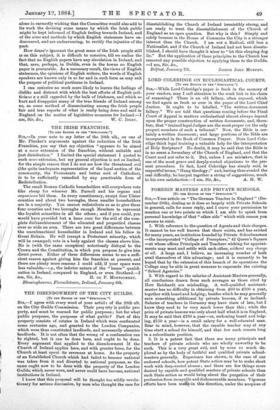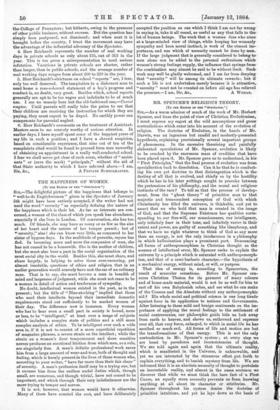FOREIGN MASTERS AND PRIVATE SCHOOLS. [To THE EDITOR OF THE
" SPECTATOR."] Sts,—Your article on "The German Teacher in England" (De- cember 29th), dealing as it does so largely with Private Schools in general, calls for some reply, and I crave your permission to mention one or two points on which I am able to speak from, personal knowledge of that " other side" which with reason you assume to exist.
1. With reference to the question of Agents and their charges. It cannot be too well known that there exists, and has existed for many years, an institution founded by Private Schoolmasters —the incorporated " College of Preceptors," 42 Queen's Square —at whose offices Principals and Teachers wishing for appoint- ments may meet and settle with each other, without any charge at all. A large and, I believe, an increasing number of both avail themselves of this advantage ; and it is earnestly to be hoped that by the extension of this branch of its operations the College may be able in great measure to supersede the existing " School Agencies."
2. With regard to the salaries of Assistant-Masters generally, all conclusions drawn from such averages as those cited by Herr Reichardt are misleading. A well-qualified assistant- master has no difficulty in obtaining from £60 to £100 a year, together with board and lodging; besides which he may generally earn something additional by private lessons, if so inclined. Salaries of teachers in Germany may have risen of late, but I know they used to be very much lower than this ; while the price of private lessons was only about half what it is in England. It may be said that £100 a year—or, reckoning board and lodg- ing, £150 a year—is a small salary for a well-educated man. Bear in mind, however, that the capable teacher may at any time start a school for himself, and that few such remain long in a subordinate position. 3. It is a patent fact that there are many principals and teachers of private schools who are wholly unworthy to be such. This is a very great evil, and by none so much de- plored as by the body of faithful and qualified private school- masters generally. Experience has shown, in the case of our endowed schools, how potent State action may be to make abort work with deep-rooted abuses ; and there are few things more desired by capable and qualified masters of private schools than such State action as would bring about the purgation of their profession from incapable and dishonourable members. Vigorous efforts have been main this direction, under the auspices of the College of Preceptors ; but hitherto, owing to the pressure of other public business, without success. But the question has simply been postponed, not dismissed ; and when next it is brought before the country, I trust the movement may have the advantage of the influential advocacy of the Spectator.
4. Herr Reichardt represents the number of real working days in private schools as only about 135, out of 313 in the year. This is too gross a misrepresentation to need serious refutation. Vacations in private schools are shorter, rather than longer, than in public schools, and the average number of Teal working days ranges from about 200 to 220 in the year.
5. Herr Reichardt's strictures on school " reports " are, I fear, only too well deserved. The temptation to a dishonest man to send home a rose-coloured statement of a boy's progress and conduct is, no doubt, very great. Besides which, school reports generally are apt to be too vague and indefinite to be of much use. I see no remedy here but the old-fashioned one,—Caveat emptor. Until parents will really take the pains to see that their children are receiving the instruction for which they are paying, they must expect to be duped. No earthly power can compensate for parental neglect.
6. Herr Reichardt's comments on the treatment of Assistant- Masters seem to me scarcely worthy of serious attention. In earlier days, I have myself spent some of the happiest years of my life in such a position ; and I have a shrewd suspicion, based on considerable experience, that nine out of ten of the complaints cited would be found to proceed from men unworthy of obtaining an appointment in a really well-conducted school. I fear we shall never get clear of such scum, whether of " assist- ants " or (save the mark) " principals," without the aid of that State authority to which I have referred above.—I am,







































 Previous page
Previous page